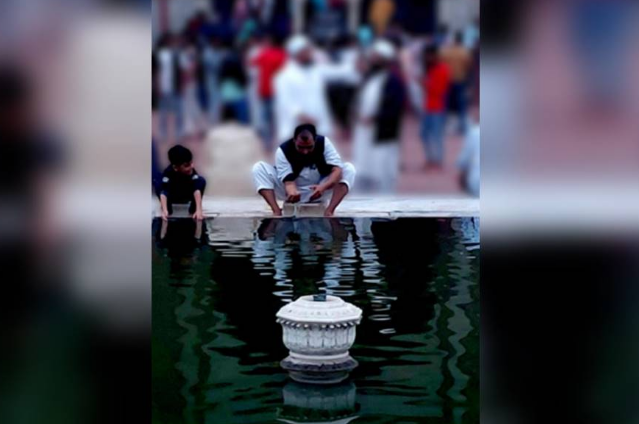
Hours of run
For my eyes.
Rummaging around
To picturize,
You,
That sits
In this holy credence
With all its walls...
Pulpits, minarets, and their
significance.
Where civilizations bloom
And cultures gather,
Where thousands roam
And hundreds scatter.
Let there be room
For those worshipers to line
While sitting here
I admire my divine.
Brief explanation
The poem is based on the photograph I captured on my visit to Jama masjid. To me, the picture represents how we seek to find treasures elsewhere (referring to the search for God) when we have them at our doorstep (i.e. our parents and people who have indirectly/directly helped us much like how the kid can be seen admiring his father who means the world to him). The poem is written from this child’s perspective who is unknown to rituals and worship. When taken to a mosque for the first time he is unsure of what God is and is constantly searching for him in this magnificent palace built for him, the mosque, a center of worship where some of the earliest towns and ancient cities developed. Where people led a settled life and cultural exchange took place. People from different and diverse backgrounds were brought in close affinity. Such is the significance of this place where people from generations have gathered, either in want of fulfillment of desires or to thank for their realization. The place echoes the life that developed and subsequently destroyed only to be taken over by another conqueror. In this place people continue to gather for worship and admiration of the formless. Despite boasting such a rich heritage the boy is undisturbed in his reverence to his father. The one who has raised him to be aware of his surroundings and has taken care of him since his birth, giving him all he can provide for. For the boy, his father is his entire world and Thus while the world is busy still to line and see the formless, the boy has already completed his search of the divine in the form of his father
Relevance with the theme “it’s all in the mind”
The poem is about a child whose reverence is directed to his father who means to him no less than God. While others have conglomerated to pray to God and offer congressional worship at a place constructed using artificial tools (that is the structure itself is man-made) and not something divinely built following rituals and practices to please the divine. They are all human constructs and play work of mind (to please the divine). The boy has imagined his father as his god portraying that it’s all in the mind. Others find God in image, idol, or without a form, the boy has found God in the form of his father and everyone else who has helped him directly/ indirectly. This is similar to Swami Vivekananda’s idea of service to mankind is service to god
